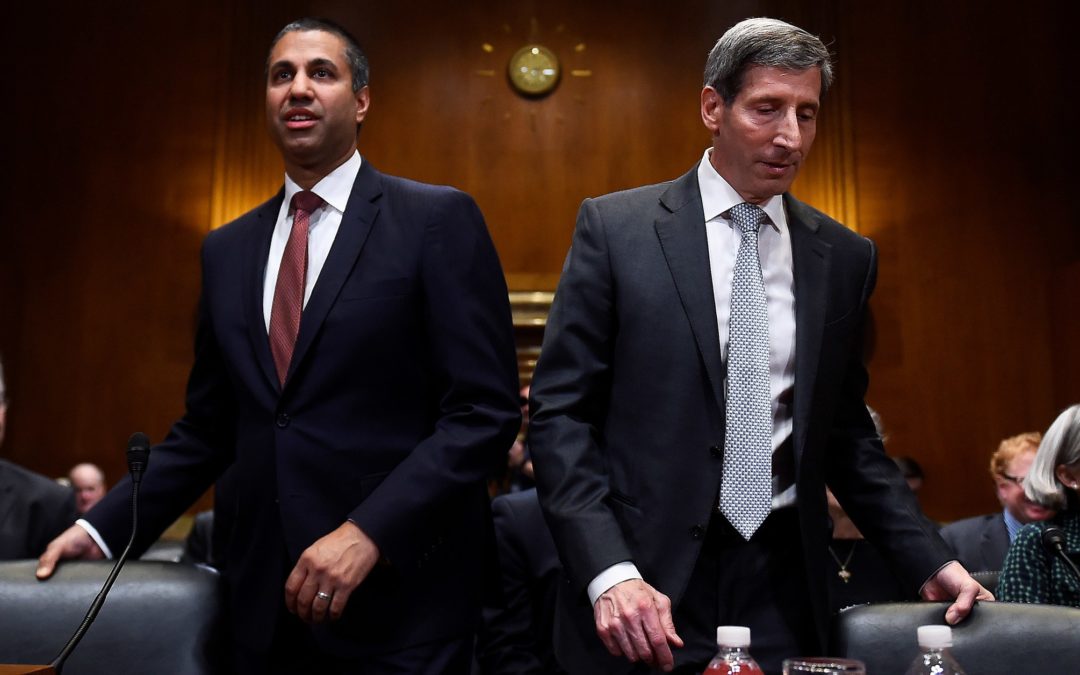FCC chairman Ajit Pai, left, has announced a new proposal to combat robocalls.
Clodagh Kilcoyne/Reuters
Despite high-profile arrests and protocols with clever names, the robocall scourge remains indomitable. On Wednesday, Federal Communications Commission chair Ajit Pai teased a new proposal to put a serious dent in the problem. Stop us if you’ve heard this one before.
On the face of it, Pai’s proposal sounds appealing. It would allow carriers to block robocalls by default, rather than on an opt-in basis. If you want even more rigorous blocking, you could, under the proposal, opt in to use your contact list as a so-called white list, bouncing any number you don’t already know. And it would grease the skids for carriers to implement standards known as “SHAKEN” and “STIR,” which will make it easier to flag calls from spoofed phone numbers. You know, the ones that are weirdly so close to your own.
“This isn’t an easy problem to solve, and we always need to be thinking about what more we can do,” Pai wrote in a blog post announcing the proposal. The FCC will vote on the matter on June 6.
These are all, by and large, fine ideas. But they’re not new ideas, and Pai’s proposal doesn’t appear to offer solutions for what has made such rules tricky to implement in the past. And while they would almost certainly help improve the current robocall nightmare—assuming they pass next month—they won’t end it altogether. In fact, they may create some new headaches along the way.
“Historically, once a technique stops working the bad guys simply move to a different technique.”
Alex Quilici, YouMail
Without knowing the exact language of the proposed rule, it’s hard to say exactly how Pai’s broad strokes will play out in practice. But the notion that carriers should block calls on behalf of consumers dates back to Tom Wheeler’s FCC, which in 2016 proposed that very thing.
“It seems to follow a familiar pattern from chairman Pai of taking things that the Obama administration did, filing off the serial numbers, and trying to take credit for it,” says Harold Feld, senior vice president of the nonprofit group Public Knowledge. “There’s a certain chutzpah in having spent the previous administration in a passionate campaign to undermine every single thing, and dissent from every single order, to now try to pretend that these are your own initiatives and take credit for them.”
Still, carriers have argued the FCC does need to clarify whether they can legally implement robocall blocking on an opt-out basis, after a legal challenge to Wheeler’s rule left that in doubt. Settling the issue could spur action on their part. What’s less clear is how effective it would be.
“Let’s assume this rule allows phone companies to implement call blocking technology that blocks all spoofed calls. That would be amazing,” says Margot Saunders, senior counsel at the advocacy group National Consumer Law Center. “What are the callers going to say about that, though? Because the law does not prohibit all caller ID spoofing. It only prohibits caller ID spoofing with intent to defraud.”
So yes, you could expect to see fewer incoming calls from numbers that look suspiciously like your own. But as Saunders notes, that’s just one kind of robocall. If that avenue of attack gets cut off, bad actors can always buy up legitimate phone numbers by the hundreds, or even thousands, to run their scams instead.
“Historically, once a technique stops working the bad guys simply move to a different technique,” says Alex Quilici, CEO of YouMail, a third-party service that offers robocall blocking. “It should help people in terms of the number of robocalls that get through and bother them, but I’m not sure it reduces the actual volume of robocalls being made. We saw this when ‘scam likely’ and other labeling came out from the carriers—and suddenly everyone made more robocalls.”
Consumer advocates also wonder who exactly will pay for all of this. Digging a moat against robocalls doesn’t come cheap, and positioning it as an opt-out service could potentially simply add another automatic line-item to your monthly bill. “I have a strong suspicion that what carriers really want is an ability, whether you want it or not, to put a robocall-blocking fee on your bill and charge you for that,” says Feld. “There’s no economic incentive for carriers to improve robocall blocking. As with a lot of things, like 911 or emergency services, it’s a cost that doesn’t yield back profit unless you get permission to tack this on as a fee.”
Yes, in that scenario you’d be able to opt out if you wanted to, and at least you’d be getting fewer robocalls as part of the bargain. But consider how closely you look at your mobile bill, and how often, and remember that any solutions on the table right now will help with the robocall problem but not solve it entirely. The calculus suddenly doesn’t look so simple.
The good news is that those who spend their days mired in the robocall nightmare generally agree that Pai’s proposal is a good, important step. But context matters. These are solutions that have bounced around for years, and that promise incomplete results at best. That’s absolutely better than nothing. But it’s still not as much as you deserve.
More Great WIRED Stories
- The hacker group on a supply-chain hijacking spree
- My search for a boyhood friend led to a dark discovery
- LA’s plan to reboot its bus system using cell phone data
- The antibiotics business is broken, but there’s a fix
- Move over, San Andreas: There’s a new fault in town
- 💻 Upgrade your work game with our Gear team’s favorite laptops, keyboards, typing alternatives, and noise-canceling headphones
- 📩 Want more? Sign up for our daily newsletter and never miss our latest and greatest stories
